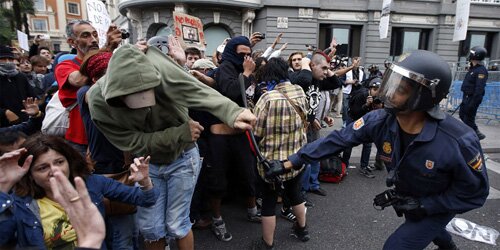The dark arts come back to haunt Coulson
1:02 pm - July 11th 2009
| Tweet | Share on Tumblr |
While most are only following this News of the World story back to when Clive Goodman was found, with the help of the private investigator Glenn Mulcaire, to have intercepted the messages of Prince William, as well as other flunkies in the royal household, it in fact goes further back to the arrest of Stephen Whittamore, a private detective who was used by almost every national tabloid, as well as a few broadsheets, to gain information not just from cracking into mobile phones but also from national databases which he had more than a knack of blagging into.
Whittamore, for reasons known only to himself, kept a complete database of every request from every newspaper and from every journalist, a database which was then seized by the Information Commissioner, Richard Thomas, and released back in December 2006, albeit sans the details concerning the journalists themselves. The News of the World wasn’t even top of the list, although there were still 19 journalists making 182 separate transactions.
Top was the Daily Mail, clearly Whittamore’s top clients, with a staggering 58 separate hacks or employees making a total of 952 requests for information. The ICO’s reports, What Price Privacy? and What Price Privacy Now? (both PDFs) went into further details on the extent of blagging.
The most comprehensive account of Whittamore’s arrest and subsequent trial was in… Flat Earth News by none other than Nick Davies.
Davies dedicates an entire chapter in the book to what became known in various newspaper offices as “the dark arts”. Some, it must be stated, have used “the dark arts” quite legitimately in stories which were clearly in the public interest, especially during the 90s. Equally clearly however it soon got completely out of control, and the laziest of journalists turned to these “private investigators” as their first port of call, even just to gain home addresses which were otherwise freely available.
The key difference between Whittamore and Goodman and Mulcaire is that they were prosecuted under different legislation. Whittamore was tried under the Data Protection Act, having breached and blagged his way into numerous national databases, including the police’s, which was his undoing, while Goodman and Mulcaire, having only been identified as gaining access to mobile phone voicemail boxes, were tried under the Regulation of Investigatory Powers Act.
The then Information Commissioner, Richard Thomas, had wanted the law tightened so that journalists caught using private detectives to access national databases would face a potential jail sentence; this was fought off through lobbying by Associated Newspapers, News International and the Telegraph group, which remarkably today said nothing about the Guardian’s new revelations, although tomorrow it does have a follow up.
It is then ridiculous that this is the Graun out to get Andy Coulson in some sort of pact with Labour, as some Tory bloggers have claimed, especially considering just how critical the paper has been recently of Gordon Brown. Rather, this is simply good old-fashioned journalism by Nick Davies, following his investigation up to the bitter end, and having found an uncannily good source that told him about the payouts to Gordon Taylor and others.
It’s also remarkable that News International has not denied a single thing about the Guardian story, instead simply stating that they are bound by the confidentiality of the settling of the cases.
What does stink however, and is even more remarkable has been the Metropolitan police’s amazingly fast review of the evidence, which established in double quick time that there was no need for a reinvestigation, and that John Prescott’s phone, as alleged by the Graun, had not been one of those hacked into. Before passing judgement and looking into potential conspiracy theories, we should note that we’re still uncertain just how far the Met’s investigation into the hacking and blagging which was going on in Wapping went.
Nick Davies on Newsnight made his own thinking clear on John Yates’ statement, suggesting that they had narrowed it down specifically to that which Clive Goodman was involved in, or at least had so that they wouldn’t have to look again. Instead, as the papers revealed during Gordon Taylor’s civil action suggested, the police appear to have conducted a thorough investigation into what had been going on as a whole, and this uncovered the at least hundreds of examples, if not thousands as the Guardian has said, of phones being hacked into.
Whatever the case, that Yates has reviewed the case so quickly, not even taking a whole day to delve into what could well have hundreds if not thousands pages of evidence, suggests that the police were minded from the outset only to go after the hacking of the royals. That, it seems, was crossing an invisible line. It’s worth remembering that the Metropolitan police and indeed the police as a whole have had remarkably good relations, not just with the News of the World, but also with the News International stable as a whole.
What should have happened back in January 2007 was a complete audit of the press by its regulatory body, a thorough investigation in which it demanded to know just how widespread such practices were, and from which specific guidelines, if not legislation, would be drawn up to stop the casual breaking of the law in search of such petty and not in the public interest information. Instead it almost seems as if there was an agreement between the PCC and the News International that as long as Andy Coulson also went, it would say nothing and everything could return to normal, as Roy Greenslade insinuates might well have happened.
This was just a one-off, even if the Steve Whittamore raid proved comprehensively that it wasn’t.
Indeed, if we were being fair this wouldn’t be about the News of the World, Murdoch or Coulson at all. This would about a press that is getting ever more desperate as its condition weakens. Perhaps the excesses which it once resorted to, especially during the 80s, are not quite being plumbed, although the Alfie Patten case, the Sunday Express’s Dunblane story and now this all certainly come close.
The one thing that is now needed is confirmation that these practices, except in cases of the utmost public interest, have ceased. The PCC has shown itself to be woefully inadequate to confirm just that. Self-regulation, at least in its current toothless form, has failed. If Coulson wants to save his job, he perhaps ought to be telling his boss that those hated privacy laws might now be needed after all.
Cross-posted from Obsolete
| Tweet | Share on Tumblr |  |
'Septicisle' is a regular contributor to Liberal Conspiracy. He mostly blogs, poorly, over at Septicisle.info on politics and general media mendacity.
· Other posts by Septicisle
Story Filed Under: Blog ,Conservative Party ,Media ,Our democracy ,Westminster
Sorry, the comment form is closed at this time.
Reader comments
Scepticisle: “The key difference between Whittamore and Goodman and Mulcaire is that they were prosecuted under different legislation. Whittamore was tried under the Data Protection Act, having breached and blagged his way into numerous national databases, including the police’s, which was his undoing, while Goodman and Mulcaire, having only been identified as gaining access to mobile phone voicemail boxes, were tried under the Regulation of Investigatory Powers Act.”
My guess is that the prosecutions used different law because the RIPA is so new. Whittamore was clearly in breach of the data protection act and it served the purpose; the fact that Goodman and Mulcaire were successfully prosecuted under RIPA establishes a precedent. Whether that precedent is meaningful depends on the toothfulness of prosecutors.
Reactions: Twitter, blogs
-
Liberal Conspiracy
Article: The dark arts come back to haunt Coulson http://bit.ly/yABKf
[Original tweet] -
Paranormal Guru
Liberal Conspiracy » The dark arts come back to haunt Coulson: Before passing judgement and looking into potenti.. http://bit.ly/LcnfQ
[Original tweet] -
Tim Ireland
Septicisle: The dark arts come back to haunt Coulson http://bit.ly/2KObM or http://bit.ly/190EAR
[Original tweet] -
Liberal Conspiracy
Article: The dark arts come back to haunt Coulson http://bit.ly/yABKf
[Original tweet] -
The dark arts come back to haunt Coulson
[...] Random Feed wrote an interesting post today onHere’s a quick excerptWhile most are only following this News of the World story back to when Clive Goodman was found, with the help of the private investigator Glenn Mulcaire , to have intercepted the messages of Prince William, as well as other flunkies in the royal household, it in fact goes further back to the arrest of Stephen Whittamore, a private detective who was used by almost every national tabloid, as well as a few broadsheets, to gain information not just from cracking into mobile phones but also from [...]
-
Paranormal Guru
Liberal Conspiracy » The dark arts come back to haunt Coulson: Before passing judgement and looking into potenti.. http://bit.ly/LcnfQ
[Original tweet] -
Twitted by paranormalguru
[...] This post was Twitted by paranormalguru [...]
Sorry, the comment form is closed at this time.
NEWS ARTICLES ARCHIVE





















